- Home
- Neal Stephenson
The Rise and Fall of D.O.D.O.
The Rise and Fall of D.O.D.O. Read online
DEDICATION
FOR LIZ DARHANSOFF
CONTENTS
COVER
TITLE PAGE
DEDICATION
AUTHORS’ NOTE
PART ONE
PART TWO
PART THREE
PART FOUR
PART FIVE
ACKNOWLEDGMENTS
CAST OF CHARACTERS
GLOSSARY
ABOUT THE AUTHORS
ALSO BY NEAL STEPHENSON
ALSO BY NICOLE GALLAND
COPYRIGHT
ABOUT THE PUBLISHER
AUTHORS’ NOTE
To the reader:
For your convenience we have included a list of characters as well as a glossary of acronyms and terms that are unique to the D.O.D.O. world. Because the lists contain many spoilers, we have placed them at the back of the book.
N. S. and N. G.
PART
ONE
Diachronicle
(PREAMBLE, JULY 1851)
MY NAME IS MELISANDE STOKES and this is my story. I am writing in July 1851 (Common Era, or—let’s face it—Anno Domini) in the guest chamber of a middle-class home in Kensington, London, England. But I am not a native of this place or time. In fact, I am quite fucking desperate to get out of here.
But you already knew that. Because when I’m done writing this thing—which, for reasons that will soon become clear, I’m calling Diachronicle—I am going to take it to the very discreet private offices of the Fugger Bank, Threadneedle Street, lock it up in a safe deposit box, and hand it over to the most powerful banker in London, who is going to seal it in a vault, not to be opened for more than one hundred and sixty years. The Fuggers, above all people in this world, understand the dangers of Diachronic Shear. They know that to open the box and read the document sooner would be to trigger a catastrophe that would wipe London’s financial district off the map and leave a smoking crater in its place.
Actually, it would be much worse than a smoking crater . . . but a smoking crater is how history would describe it, once the surviving witnesses had been sent off to the madhouse.
I’m writing with a steel-nibbed dip pen, model number 137B, from Hughes & Sons Ltd. of Birmingham. I requested the Extra Fine Tip, partly to save money on paper, and partly so that I could jab my thumb with it and draw blood. The brown smear across the top of this page can be tested in any twenty-first-century DNA lab. Compare the results to what is on file in my personnel record at DODO HQ and you will know that I am a woman of your era, writing in the middle of the nineteenth century.
I intend to write everything that explains how I came to be here, no matter how far-fetched or hallucinatory it may sound. To quote Peter Gabriel, a singer/songwriter who will be born ninety-nine years from now: This will be my testimony.
I DO ATTEST that I am here against my will, having been Sent here from September 8, 1850, and from the city of San Francisco, California (the day before California was granted statehood).
I do attest that I belong in Boston, Massachusetts, in the first quarter of the twenty-first century. There, and then, I am part of the Department of Diachronic Operations: a black-budget arm of the United States government that has gone rather badly off the rails due to internal treachery.
In the time in which I write this, 1851, magic is waning. The research that DODO paid me to perform indicates that magic will cease to exist at the end of this month (July 28). When that happens, I will be trapped here in a post-magic world for the rest of my days. The only way anyone will ever know what became of me is through this deposition. While I have managed to land myself in comfortable (by 1851 standards) quarters with access to pen, ink, leisure time, and privacy, it has been at the expense of freedom; my hosts would not consider allowing me out of the house alone for an evening constitutional, let alone to seek out witches who might help me.
One comment before I begin. If anyone from DODO ever reads this, for the love of God please add corset-makers to the list of abettors we need to recruit in any Victorian DTAPs. Corsets are intended to be custom-made to conform to the actual shape of a lady’s body, and it’s uncomfortable to have to borrow one or buy one “off the rack,” although servants and poorer women generally do that (but do not lace them tightly, as they must engage in manual labor). Being here entirely on charity, I prefer not to ask my hosts to extend credit for a custom-fit one, but wearing this one (borrowed from my hostess) is just awful. It makes a Renaissance bodice feel like a bikini, I’m not even kidding.
Diachronicle
DAY 33 (LATE AUGUST, YEAR 0)
In which I meet Tristan Lyons and immediately agree to get into more trouble than I could possibly realize at the time
I MET TRISTAN LYONS IN the hallway outside the faculty offices of the Department of Ancient and Classical Linguistics at Harvard University. I was a lecturer, which means that I was given the most unpopular teaching assignments with no opportunity for university-supported research and no real job security.
On this particular afternoon, as I was walking down the hallway, I heard voices raised within the office of Dr. Roger Blevins, Department Chair. His door was slightly ajar. Usually it gaped open, so that anyone walking by might glance at his ego-wall, upon which hung every degree, honor, and accolade he’d ever collected, honestly or otherwise. When not yawning thus, the door was tightly closed, advising “Do Not Disturb” in 48-point Lucida Blackletter to make sure we all understood how exclusive his company was.
But here it was, uncharacteristically a quarter open. Intrigued, I glanced in, just as a clean-cut man was making a decisive exit, looking back at Blevins with an expression somewhere between disgust and bemusement. His biceps smacked into my shoulder as he ploughed into me with enough force to throw me off balance. I pivoted backward and landed sprawled on the floor. He retreated instinctively, his backpack smacking into the doorjamb with a hard thump. From within the office, Blevins’s voice was hurling a stream of invective.
“Apologies,” the man said at once, turning red. He was about my age. He slipped out into the hallway and began to reach toward me to help me up.
The door swung farther open, quite forcefully—right into my shin. I made a noise of pained protest and the pompous voice from within the room went silent.
Blevins—thick grey hair perfectly immobile, dressed as if he expected at any moment to be sworn in to give expert testimony—emerged from his office and peered down at me disapprovingly. “What are you doing there?” he asked, as if he’d caught me spying.
“My fault, I’m sorry, miss,” said the young man, again holding his hand toward me.
Blevins grabbed the edge of the door and began pulling it closed. “Watch where you’re going,” he said to me. “If you’d been in the middle of the hall you’d have avoided a collision. Please collect yourself and move on.”
He gave the young man a look I could not make out from where I was, then turned back into his office, closing the door hard behind him.
After a second of stunned silence, the young man extended his hand closer to me and I took it, with a nod of thanks, to rise. We were standing quite close to each other.
“I am . . .” he began again. “I am so very sorry—”
“It’s fine,” I said. “If you’ve annoyed Roger Blevins, how bad can you be?”
At that he looked startled—as if he’d come from someplace where speaking ill of the brass simply wasn’t done. We kept staring at each other. It seemed a perfectly normal thing to do. He was nice to look at in an ROTC sort of way, and his expression implied he didn’t mind looking at me either, although I am not the sort the ROTC boys ever took an interest in.
Suddenly he held out his hand. “Tristan Lyons,�
�� he said.
“Melisande Stokes,” I rejoined.
“You’re in the Ancient and Classical Linguistics Department?”
“I am,” I said. “I’m an exploited and downtrodden humanities lecturer.”
Once again, that startled, wary look. “I’m treating you to coffee,” he said.
That was presumptuous, but I was so pleased with him for upsetting Blevins that it would have been churlish to turn him down.
He wanted to take me to the Apostolic Café in Central Square, which was perhaps ten minutes by foot down Mass Ave. It was that time of year in Boston when the summer feels definitely over, and the city’s seventy-odd colleges and universities are coming back to life. Streets were jammed with parental minivans from all over the Northeast, moving their kids into their apartments and dorm rooms. Sidewalks were clogged with discarded sofas and other dump-bound furniture. Add that to the city’s baseline traffic—people, cars, bikes, the T—and it was all very loud and bustling. He used that as an excuse to cup my elbow in one hand, keeping me close to him as we walked. Presumptuous. As was the very idea that you could walk two abreast in such a crowded place. But he kept making a path through the crowd with expectant looks and crisp apologies. Definitely not from around here.
“Can you hear me clearly?” he said almost directly into my ear, my being half a step ahead of him. I nodded. “Let me tell you a couple of things while we’re walking. By the time we get to the café, if you think I’m a creep or a nutcase, just tell me, and I’ll simply buy you a coffee and be on my way. But if you don’t think I’m a creep or a nutcase, then we’re going to have a very serious conversation that could take hours. Do you have dinner plans?”
In the society I inhabit currently, such an approach would be considered so outrageous that when I think on it, it is hard to believe I did not instantly excuse myself and walk away from him. On the contrary, at the time I found his awkward inappropriateness, his bluntness, rather compelling. And I confess, I was curious to hear what he had to say.
“I might,” I said. (Confession: I did not.)
“All right, listen,” he began. “I work for a shadowy government entity, you’ve never heard of it, and if you try to Google it, you won’t find any reference to it, not even from conspiracy-theory nuts.”
“Conspiracy-theory nuts are the only ones who would use a term like ‘shadowy government entity,’” I pointed out.
“That’s why I use it,” he retorted. “I don’t want anyone to take me seriously, it would get in the way of my efficiency if people were paying attention to me. Here’s what we need. Tell me if you’re interested. We have a bunch of very old documents—cuneiform, in one case—and we need them translated, at least roughly, by the same person. You’ll be paid very well. But I can’t tell you where we got the documents, or how we got them, or why we’re interested in them. And you cannot ever tell anyone about this. You can’t even say to your friends, ‘Oh, yeah, I did some classified translating for the government.’ Even if we publish your translation of it, you can’t take ownership of it. If you learn something extraordinary from translating the material, you can’t share it with the world. You’re a cog in a piece of machinery. An anonymous cog. You’d have to agree to that before I say another word.”
“That’s why Blevins threw you out,” I said.
“Yes, he’s strongly committed to academic freedom.”
Dear reader, give me credit for not going LOL on mocking him. “No he isn’t.”
This startled Tristan, who looked at me like a puppy after you’ve stepped on his tail. On second thought, given his ROTC bearing, let’s make that a mature German shepherd.
“He was pissed off that he’d never get any glory or royalties,” I explained. “But he knew he couldn’t say that. So, academic freedom or whatever.”
Tristan seemed to actually think about this as we crossed Temple Street. His type are trained to respect authority. Blevins was nothing if not authoritative. So, this was a little test. Was his straight-arrow brain going to explode?
Through all the bustle, in the golden light of early autumn, I could see the entrance to the Central Square T stop. “What’s your position?” he asked me.
“On academic freedom? Or getting paid?”
“You haven’t kicked me to the curb yet,” he said. “So, I guess we’re talking about the latter.”
“Depends on the paycheck.”
He named an amount that was twice my annual salary, with the caveat “. . . once you convince me you’re the right person for the job.”
“What will the translations be used for?”
“Classified.”
I tried to think of reasons not to pursue this lucrative diversion. “Could they somehow be justification for unethical actions, or physical violence, on the part of your shadowy government entity?”
“Classified.”
“That’s a yes, then,” I said. “Or at least a possibly. You’d have just said no otherwise.”
“That amount I just mentioned? It’s for a six-month contract. Renewable by mutual agreement. Benefits negotiable. Are we having coffee together or not?” We were nearing the turn to the Apostolic Café.
“No harm in coffee,” I said. Stalling for time, trying to wrap my head around the math: four times my current take-home pay, which would never include benefits. Not to mention that I’d be trading up in the supervisor department.
We entered the café, a beautiful old desanctified brick church with high vaulted ceilings, stained glass windows, and incongruously modern wood tables and chairs sprinkled across the marble floor. There was a state-of-the-art espresso station to one side and—most disconcertingly, as much as I’d overcome my upbringing—a counter set just about where the altar would once have been, and a complete wet bar curving around the inner wall of the apse. The place had only recently opened but was already very popular with the techno-geek crowd from both Harvard and MIT. It was my first time in. I felt a brief pang of envy that there weren’t enough linguists in Cambridge to warrant a designated polyglot-hangout as lovely as this.
“What’s your pleasure?” asked the barista, a young Asian-American woman with interesting piercings, tattoos in place of eyebrows, and a demeanor that blended I’m sooo interesting and this job sucks with I have a really cool secret life and this job is an awesome front. Her nametag read “Julie Lee: Professional 聪明的驴子•双簧管” (which I understood, roughly, as “Smart-ass Oboist”).
We ordered drinks—Tristan, black coffee; myself, something I would never normally have, a complicated something-latte-something with lots of buzzwords I picked out at random from the menu over the bar, and which prompted a brief smirk from our barista. The agents of shadowy government entities, I reasoned, were likely to be trained in psychological evaluation of potential recruits, and I did not want him getting an accurate read on me until I decided whether or not I wished to pursue his offer. (Also he was rather handsome, which made me jittery a bit, so I decided to hide behind an affected eccentricity.) The result being that he sat down with a lovely-smelling cup of dark roast and I sat down with something almost undrinkable.
“You ordered that to try to throw me off the scent, in case I was doing some sort of ninja psych-eval of you,” he said casually, as if just trying the idea on for size. “Ironically, that tells me more about you than if you’d just ordered your usual.”
I must have looked shocked, because he grinned with almost savage self-satisfaction. There was something disturbingly thrilling about being seen so thoroughly, so quickly, and so stealthily. I felt myself flush.
“How?” I demanded. “How did you do that?”
He leaned in toward me, large, strong hands clasped before him on the café table. “Melisande Stokes—may I call you Mel?” I nodded. “Mel.” He cleared his throat in a very official-sounding, preparatory manner. “If we’re going to pursue this,” he said, “there are three parts to it. First, before anything else, you have to sign the nondisclosure fo
rm. Then I need you to do some sample translations so we can get a sense of your work, and then we have to run a background check on you.”
“How long will all that take?” I asked.
Four times my salary. With possible dental.
And no Blevins.
He had set his backpack on a chair beside him. Now he patted it. “Nondisclosure form is right here. If you sign it now, I can text your name and social to DC.” He paused then, and reconsidered. “Never mind. They already know your social. Point is, they’ll have finished the background check before you’re done choking down whatever the hell it is you ordered. So it’s just how long it takes you to translate the test samples and have our guys look over your translations. But”—he waved a warning finger at me—“no fooling around here. Once you sign the form, you’re committing to do this. Unless we reject you. You can’t reject us. You’re stuck with me, for six months minimum, as soon as you sign the form. Got it? No half-assedness on your part. So maybe we just talk tonight and then you take the form with you and give it to me tomorrow when you’ve had a chance to sleep on it.”
“Where would I find you tomorrow?” I asked.
“Classified,” he said. “I’d find you.”
“I don’t like being stalked. I’d better sign it now,” I said.
He stared at me a moment. It wasn’t quite like that first moment, when we had stared and it had felt so strangely normal. This felt charged. But I wasn’t exactly sure why. I would like to think I was simply delighted to be ridding myself of Blevins and quadrupling my income all in one go. But if I am honest with myself I confess there was a definite pleasure in being Chosen by someone with such agreeable features.
“Right,” he said, after we had been staring for a couple of heartbeats. “Here.” He reached for his bag.
I read the form, which said precisely what Tristan had described, making it at once boilerplate and singular. I held out my hand, and Tristan offered me a government-issue ballpoint pen. A far cry from the slightly blood-smeared Hughes & Sons Ltd. model number 137B, Extra Fine, with which I am writing this.

 Zodiac: The Eco-Thriller
Zodiac: The Eco-Thriller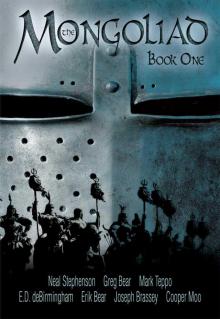 The Mongoliad: Book One
The Mongoliad: Book One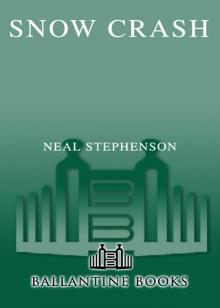 Snow Crash
Snow Crash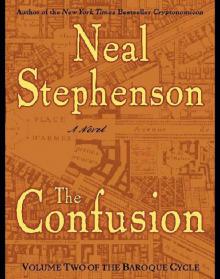 The Confusion: Volume Two of the Baroque Cycle
The Confusion: Volume Two of the Baroque Cycle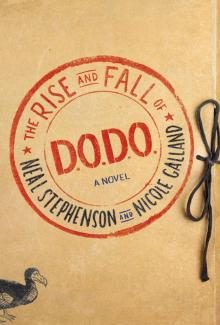 The Rise and Fall of D.O.D.O.
The Rise and Fall of D.O.D.O.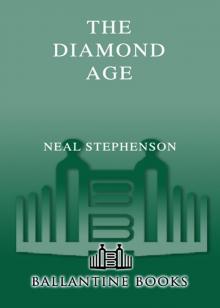 The Diamond Age: Or, a Young Lady's Illustrated Primer
The Diamond Age: Or, a Young Lady's Illustrated Primer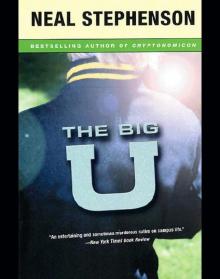 The Big U
The Big U The System of the World: Volume Three of the Baroque Cycle
The System of the World: Volume Three of the Baroque Cycle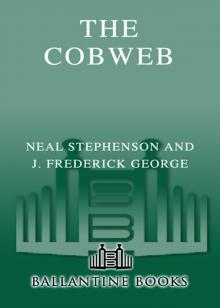 The Cobweb
The Cobweb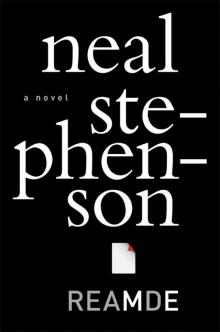 Reamde
Reamde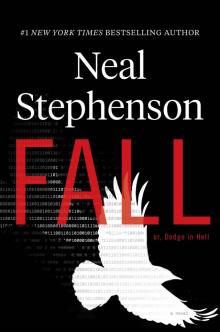 Fall; or, Dodge in Hell
Fall; or, Dodge in Hell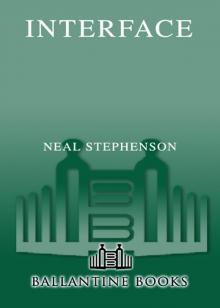 Interface
Interface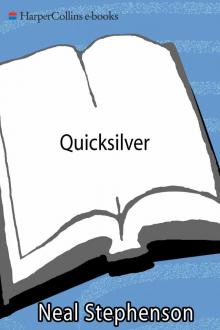 Quicksilver
Quicksilver The Mongoliad: Book Three
The Mongoliad: Book Three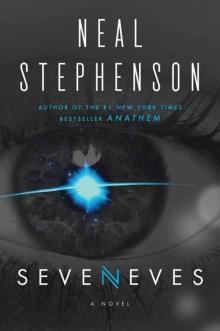 Seveneves
Seveneves Atmosphæra Incognita
Atmosphæra Incognita In the Beginning...Was the Command Line
In the Beginning...Was the Command Line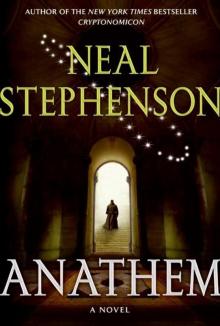 Anathem
Anathem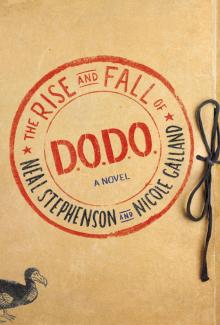 The Rise and Fall of D.O.D.O.: A Novel
The Rise and Fall of D.O.D.O.: A Novel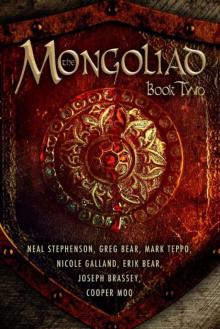 The Mongoliad: Book Two
The Mongoliad: Book Two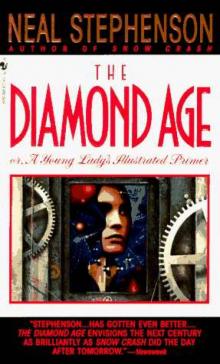 Diamond Age or a Young Lady's Illustrated Primer
Diamond Age or a Young Lady's Illustrated Primer THE System OF THE WORLD
THE System OF THE WORLD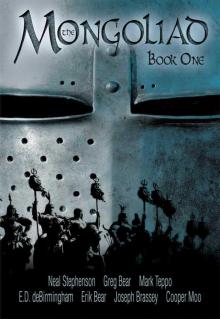 The Mongoliad: Book One tfs-1
The Mongoliad: Book One tfs-1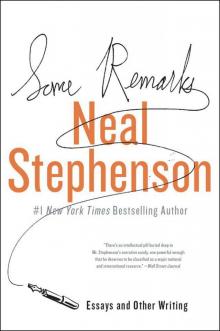 Some Remarks: Essays and Other Writing
Some Remarks: Essays and Other Writing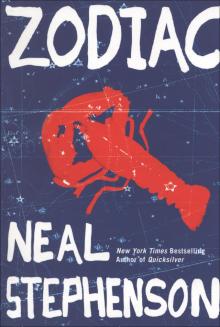 Zodiac
Zodiac Spew
Spew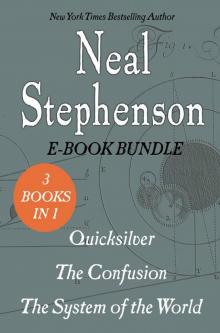 The Baroque Cycle: Quicksilver, the Confusion, and the System of the World
The Baroque Cycle: Quicksilver, the Confusion, and the System of the World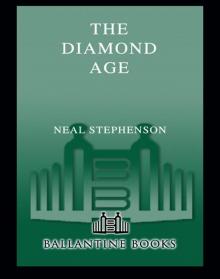 The Diamond Age
The Diamond Age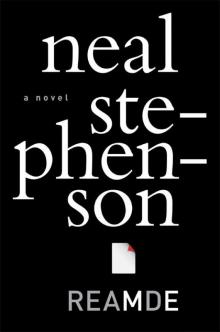 Reamde: A Novel
Reamde: A Novel In the Kingdom of Mao Bell
In the Kingdom of Mao Bell Mother Earth Mother Board
Mother Earth Mother Board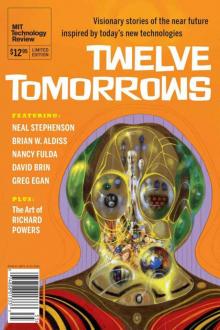 Twelve Tomorrows - Visionary stories of the near future inspired by today's technologies
Twelve Tomorrows - Visionary stories of the near future inspired by today's technologies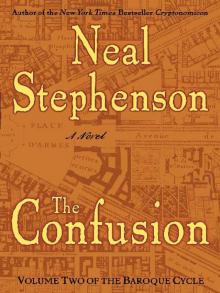 The Confusion
The Confusion The Great Simoleon Caper
The Great Simoleon Caper The Mongoliad: Book Three tfs-3
The Mongoliad: Book Three tfs-3